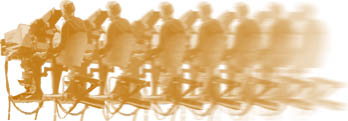
Ron's funeral, Sept 1st 2009
An Appreciation of Ron by James Moir, Former Head of Light Entertainment, BBC Television
I count myself very privileged to speak in Ron's memory today. It gives me the unique opportunity to express both for myself and for the great host of Ron's friends the profound affection, admiration and respect with which we all held this rare man, who, without effort and any self awareness has left a deep impression on all who knew him.
In a long and distinguished career, Ron touched the lives of a multitude of people and there is a universal sense of loss and sadness at his passing. Ron lent his considerable talents to countless television programmes in what was undoubtedly a golden age of programme making at Television Centre.
Like all of us who toiled at the coal face of production, Ron spent his professional life, often against the odds, in the pursuit of perfection. Ron joined the BBC in 1955 and his 35-year career spanned virtually the entirety of television's technical evolution. His experience was profound.
Ron and his crew were much in demand by LE producers and over the years Ron worked on major output ranging from the musical "Kiss Me Kate", an opening attraction for the fledgling BBC2, to Saturday night star spectaculars with Shirley Bassey, Vera Lynn, Des O'Connor, Rolf Harris, Mike Yarwood and the Two Ronnies, or as it is sometimes known – the Four Ronnies – Ronnie Barker, Ronnie Corbett, Ronnie Hazlehurst and Ron Green! The music and Arts Department recognised Ron's talents and he contributed much to the on screen 'look' of The Hot Shoe Show as well as Jonathan Miller's productions of Cosi Fan Tutte, The Beggars' Opera and Lear.
His work in Drama included the highly regarded Therese Raquin and he was immensely proud of his early work on War and Peace with a young Anthony Hopkins in the role of Pierre, who he would often give a lift into Television Centre. By any standard a rich and distinguished range of programmes and by no means the complete list.
In the camaraderie of a television studio, where mutual support is required to achieve the task, strong friendships are forged. Ron was held in the highest esteem by all who encountered him. In one of the many tributes paid to him, he is remembered as a "most delightful companion, always with a smiling face and a twinkling eye". Similarly he is remembered for his encouragement and guidance for those at the start of their careers — "imparting knowledge on a daily basis" — always patient and tolerant to those learning the skills of their craft.
I happily admit that I have benefited from Ron's wisdom — above all his tolerance as inevitably I tried to squeeze four hours of material into a three hour recording. I wonder if Ron ever knew the enormous debt of gratitude he was owed by generations of directors who benefited from his gifted and oh so fluent and confident camera work and his canny ability to get them out of trouble when the script went up the Swanee! That legendary patience allowed Ron to assist his directors, whatever level of competence they had achieved.
There is no question in my mind that Ron was other than a most able leader. Slight of frame and of a quiet demeanour, he led by example. His own camera work was an object lesson — a bench mark to all who worked alongside him — He raised the bar and by quiet determination encouraged others to go the extra mile in the service of the show.
I was never more pleased than when Ron took on the responsibility for the presentation of an entire musical number. I could write in my camera script, Shot 102, Camera 1, Developing Shot — On You Ron! — and then watch Ron move his Mole crane with subtlety and panache in perfect harmony with the music and the performance. His contribution to the high quality of presentation in BBC entertainment shows was outstanding.
Ron was the epitome of calm. When the studio clock ticked ever closer to the end of recording time and the gallery talkback sounded more like a Gordon Ramsay kitchen than a control room, Ron remained cool. Just the nod of his camera head, communicated a 'let's get it done' message to the Gallery. He was a consummate professional.
In 1989 the consistent, sustained high quality of his work was to be recognised by the award of a BAFTA "for excellence in the craft of video cameramen". This acknowledgement of his brilliant camera work on an ambitious drama "The Ginger Tree" was a most well deserved accolade in a career littered with achievement.
As his time at the BBC came to an end in 1990 a new career opened and Ron became a highly regarded and much sought after freelance, lending his well honed skills and enviable experience to new productions with new production methods and a whole range of ever-evolving technical innovations. Ron was always up to the game.
In the world of television production, Ron's name is already legend. Of course he will be remembered for his superb skills and as a kind and tolerant mentor to generations of his fellows. But, in simple language, he will be remembered as one of the nicest blokes you could hope to meet, a family man whose decency shone through and a car junkie who was never happier than when up to his elbows in the engine of one of his many classic cars.
Ronald Charles Green was a man rich in quality and rich in value. He was a loving husband and father in the service of his family; a gifted professional in the service of his vocation; the most generous of men in the service of his friends. May perpetual light shine upon him. May he rest in peace.
